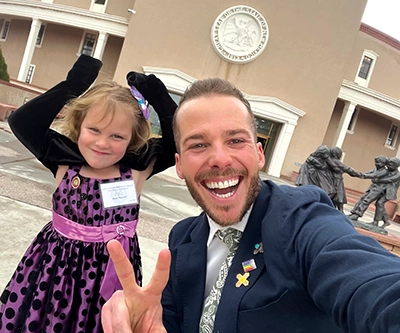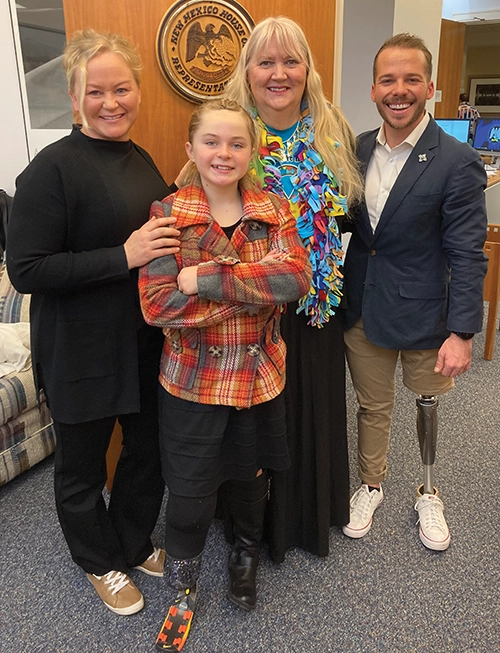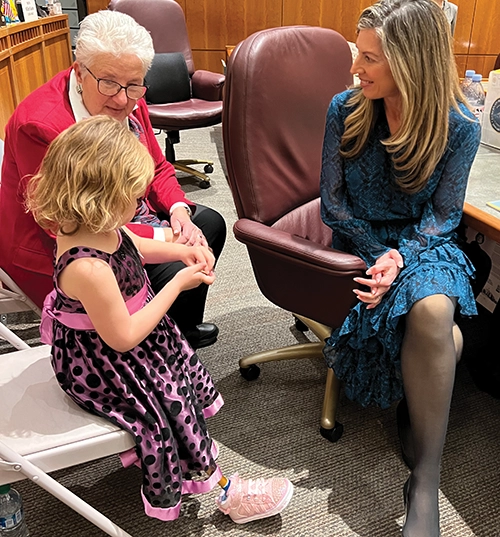In states across the country, amputees are persuading legislators to enact better, broader prosthetic insurance coverage.
By Larry Borowsky

At the start of this year, Nicole Ver Kuilen was hopeful that 2023 would bring modest progress on So Kids Can Move, a nationwide legislative initiative to strengthen insurance coverage for recreational prosthetic devices.
“We’d like to have three states introduce legislation this year,” said Ver Kuilen, the public engagement director for the American Orthotic and Prosthetic Association (AOPA), in early January. “If even one of those bills passes, we’d be extremely happy with that.”
By that standard, Ver Kuilen and her fellow advocates blew past “extremely happy” weeks ago, when New Mexico enacted the broadest prosthetic insurance law in the nation. They have since moved on to “ecstatic,” “awestruck,” and “pinching ourselves in disbelief,” as So Kids Can Move legislation charged ahead in Colorado, Indiana, Arkansas, Illinois, and New Hampshire.
All over the country—in legislative committees and full chambers, Senates and Houses, red states and blue states—elected officials from across the ideological spectrum have given their emphatic support to bills that would expand amputees’ access to athletic prostheses. As Amplitude went to press in early April, several hundred state lawmakers had considered So Kids Can Move bills. All except seven soreheads from Arkansas had voted in favor.
That’s not a typo. Through three months of legislating, the aggregate national tally stood at seven nays and approximately 400 yeas. As of April 1, New Mexico’s bill was the only one that had reached the finish line and garnered a governor’s signature. Others may have joined it by the time you read this in early May. (Get up-to-the-moment updates from all six states in Amplitude‘s 2023 Legislation Tracker.)
In a climate that rarely produces bipartisan wins—particularly on issues as divisive as healthcare—these results are nothing short of miraculous. But they weren’t achieved through divine intervention. They’re the product of common-sense political strategies and tactics that can be replicated in other states.
In fact, the So Kids Can Move bills are themselves an attempt to replicate a groundbreaking 2022 Maine law that requires insurers to cover recreational prostheses for amputees ages 18 or younger. Most of this year’s bills have expanded Maine’s policy to offer more comprehensive solutions. New Mexico’s new law covers amputees of all ages. Ditto Colorado’s pending bill. Indiana’s legislation applies to shower legs as well as recreational devices.
“I don’t think this would have been possible five years ago,” says Ver Kuilen, who ought to know—she’s been lobbying legislators for fairer prosthetic insurance since 2017 through her nonprofit, Forrest Stump. What’s changed since then? One answer is that Americans have a better understanding of disability, thanks to years and decades of persistent advocacy. But a more important factor may be that amputees themselves have become better advocates—sharper communicators, stronger collaborators, savvier players of the legislative chess game.
All those skills were on display in New Mexico, where the limb-loss community put on a master class in political organizing, messaging, and persuasion. Here’s a summary of what they did to make their state a beacon of fair prosthetic insurance—and what disability rights advocates across the country can learn from them.
Find the Right Spokespeople
“The best way to empower communities is to give them the microphone,” says Kyle Stepp. A 28-year-old above-knee amputee who’s been educating leaders about health equity for more than a decade, Stepp dazzled New Mexico legislators with his powerful storytelling and deft negotiating. During committee hearings, he and his fellow advocates brought tears to the eyes of lawmakers—even flinty, Stetson-hatted gents from windswept ranching districts.

Courtesy AOPA
“Kyle is a dream ambassador,” says state representative Liz Thomson, the original sponsor of the So New Mexicans Can Move bill. “Yes, he’s incredibly organized and incredibly driven and committed and all those good things. But Kyle is magic. People just fall in love with him. He’s like a ray of sunshine for everybody, from the most staunch Republican to the most liberal legislator. He’s just what Hollywood would have ordered.”
In addition to his central-casting persona, Stepp possesses campaign experience and solid relationships within Santa Fe’s political class. But he’s quick to shoot down the idea that he has special gifts or insights that others lack.
“There are people like me in every community,” he says. “And all we need to do is represent ourselves. Because if you don’t have personal life experience with something, it’s hard to convey the reality of what an individual faces. If we really want to make change, we just need to let the community educate the elected officials. Just give us a seat at the table and allow us to speak.”
Two other amputee speakers in New Mexico—12-year-old Callaway Lewis and six-year-old Hope Burnett—were at least as effective as Stepp in expressing the unfairness of the state’s existing prosthetic insurance policies. “Having Hope and Callaway there to share their stories, face to face with legislators, was the game changer,” says state senator Siah Correa Hemphill, who sponsored New Mexico’s bill in her chamber. The girls even pierced the formidable armor of state senator Craig Brandt, a regular (and often bitter) nemesis of Hemphill’s, when they appeared before the Senate Tax Committee.
“[Brandt] was the very first senator on the committee to speak,” Hemphill recalls, “and he said: ‘Anyone who has the audacity to speak in opposition to this bill should be publicly flogged.’ I was not expecting that.”
A week or two later, after the bill passed unanimously in the full senate, Brandt approached Hemphill and gave her a hug. The previous day they’d ripped each other to shreds over their differences on abortion policy. “But this piece of legislation resonated with both of us,” Hemphill says. “We were both in tears. It was just the kind of bill that brought people together.”
Be Open to Dialogue
The New Mexico advocates were single-minded in their pursuit of prosthetic insurance reform, but they were never close-minded. Stepp, in particular, combined an ability to argue his case forcefully with an ability to hear other perspectives. He extended that courtesy to legislators from both parties, state insurance regulators, healthcare administrators, even the lobbyists for New Mexico’s biggest insurance companies.
“He is intense about getting something done,” Ver Kuilen says. “But he goes about it in a way that’s approachable, and he’s flexible enough to meet people where they are.”

Courtesy AOPA
That flexibility played a decisive role early in the committee process, when fiscal analysts determined that the bill would impose significant costs on New Mexico. The original legislation was structured around an insurance mandate, which would have triggered a provision under the Affordable Care Act known as a state defrayal. An exhausting battle over the arcana of federal healthcare financing might have ensued, alienating potential allies and dooming the bill. Instead, Stepp and Thomson chucked the mandate and found an alternate mechanism that would accomplish the same policy goals.
“I immediately asked, ‘Can we schedule a conversation?’” Stepp says. “I just have the philosophy that that’s the way to get the best outcome. We had to understand where everyone was coming from to come up with that solution.”
The dialogue produced a new formula that was rooted in anti-discrimination laws that are already on the books. “We just started talking about what’s covered for nondisabled versus disabled patients who have injuries that affect their mobility,” Stepp explains. “If the injury is a torn ACL, and you need surgery and rehab, everything you need to get back to full, maximum mobility—including the ability to run and play sports—is covered by insurance. But if the injury is limb loss, and the only way to get back to maximum mobility is with a secondary prosthetic, the insurance companies will not allow you to do that.”
Once the bill was reframed as an attempt to abolish insurance discrimination on the basis of disability, resistance evaporated. The elimination of the mandate not only made the bill revenue-neutral, it also cornered opponents into defending discriminatory practices. Not even the insurance companies could bring themselves to resist the bill any longer.
“At our first Senate committee hearing, Blue Cross Blue Shield had told us they were going to speak in respectful opposition,” Hemphill says. “They were last in line to testify. And when they came up to the microphone, they said that because of the stories that Kyle, Hope, and Callaway had shared, they had reconsidered and they were going to support the bill.”
“I built a deep relationship with the lobbyists from Blue Cross Blue Shield and Presbyterian [Healthcare Services, another large New Mexico insurer],” says Stepp. “We recognized this had to work from the business side, so we were willing to have a conversation about how to make it work. We brought in experts; I’m not the expert in insurance code. You have to be willing to bring everyone to the table. You need the humility to know that you don’t have all the answers. And you have to make sure every single person who’s involved feels like this is their bill.”
Make It Easy to Join the Coalition
“What happened in New Mexico is an example of great policymaking combined with the nuts and bolts of a successful advocacy campaign,” Ver Kuilen says.
That campaign encompassed citizen supporters in every New Mexico legislative district. They included not only amputees and their families but also prosthetists, physical therapists, adaptive sports programmers, children’s advocates, and other allies. The lead advocates organized all those names in a spreadsheet, cross-referenced them with legislators’ contact info, and used the database to track every interaction with lawmakers and monitor their level of support. They also created a supremely accessible app that made it easy for new, inexperienced activists to get involved.
The grassroots effort drew on the support and resources of national allies. AOPA and the National Association for the Advancement of Orthotics and Prosthetics, which originated the So Kids Can Move campaign last summer, sounded out legislators in multiple states, including New Mexico. By the start of this year two other limb-loss organizations had come on board: the Amputee Coalition and the American Academy of Orthotists and Prosthetists.
“A huge part of why this has been so successful is the partnerships we’ve built,” Ver Kuilen says. She’s also convinced that the seeds of this year’s bountiful legislative harvest were planted long ago and have been patiently nurtured by advocates of many types—not only in the political arena.
“The awareness around disability is the highest it’s ever been,” she says. “There’s more visibility for people with disabilities in commercials. There’s a really strong Paralympics movement. There are movies like Rising Phoenix and Crip Camp that are part of the everyday conversation. And then what happened in Maine last year was huge. That was when people started to understand that this can be done. Up to that point, people felt beaten down by the insurance companies. But the Maine law ignited hope. And we grabbed onto that and started getting the word out that this is possible.”




